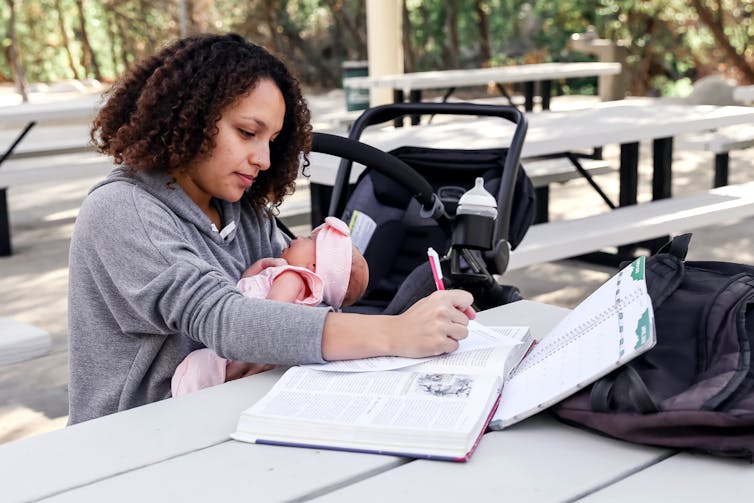Student housing is scarce for college students who have kids
More than 1 in 5 college students are parents, and many struggle to find on-campus housing. Colleges offering a stable place to live on campus can help them succeed.

Before the family housing program opened at his university, Blake and his two young daughters were couch-surfing at the homes of their friends and family.
“They only saw me coming and going,” Blake explains, describing how he had to juggle a job at a local casino, college classes and parenting as a single homeless dad pursuing a career in nursing.
When the university opened its family housing program in 2014, Blake and his daughters were among the first to move in. Living on campus changed their lives. The girls claimed a place within the college community. They made friends with people across campus, ate with their dad in the dining hall and did homework together as a family. And Blake was able to better focus on his studies.
The program – which has since been discontinued – is a rarity in higher education.
According to a Campus Family Housing Database that I created with my colleague, Sarah Galison, just 8% of all U.S. colleges and universities offer on-campus housing for college students who are parents. This does not take into consideration whether the housing is affordable, or the number, size or availability of family housing units. Furthermore, we found that 28 institutions closed their family housing programs between 2014 and 2019, many without announcement.
This scarcity of student housing poses a serious dilemma for the nearly 4 million undergraduate college students in the United States – or more than one out of every five – who are parents.
I am a sociologist with expertise in housing issues for student parents. I worked with the program that helped Blake and his daughters as part of an effort to replicate a national program that promoted comprehensive support for single parents. That comprehensive support included safe and affordable housing. My job was to serve as a consultant, provide technical assistance and evaluate the program from 2013 through 2017.
Eventually the college created an on-campus resource center for these students and phased out on-campus family housing. This approach was less expensive and able to serve more of the college’s student parents. While I understood the need for this approach in order to sustain services for single parents at the college, I continued to stress the importance of safe and affordable housing within the college community.
I worried about the fate of students like Blake who need housing to succeed in school.
A serious dilemma
College students who are parents are disproportionately low-income and students of color. In addition, one in three students who are the first in their family to go to college are parents.
According to the Temple University Hope Center, 66% of student parents experience housing insecurity during college, and an additional 16% experience homelessness. When basic needs such as housing, food and safety are not met for these families, it becomes harder for them to focus on school and graduate. When family housing is provided, it creates a sense of inclusion, community and belonging for student parents and their families, who often feel unseen and excluded from campus life.

While programs that offer family housing for student parents exist, information about these programs can be difficult to find. That’s what led us to create the Campus Family Housing Database.
To the best of my knowledge, the database is the first online tool that identifies which colleges and universities offer housing to college students who are parents. Galison and I collected data on every regionally accredited U.S. college and university. The database is current as of spring 2019, and we are working to update it for 2021.
Lack of campus housing for students who are parents is not just a housing issue. It’s an education issue. When student parents are able to be part of campus life and to spend time with their children, they are more likely to complete their degrees.
Building a community
Some colleges have had on-campus housing programs for student parents since just after World War II.
One of them is the University of Oregon, which I attended as a young undergraduate student – and a parent with two kids. Living on campus and enrolling my children in the college’s child care center, I had only to walk across the parking lot to drop off and pick up my kids each day, before riding my bicycle to class.
I connected with other sociology major moms who lived in the family housing community. We held study groups in the living rooms of each other’s on-campus apartments while our kids played together in the next room. I always knew my rent and utility bills were paid, because they were deducted from my financial aid each term.
I graduated with honors, magna cum laude and an acceptance letter to graduate school.
Paying attention
Now that university budgets are becoming tight due to COVID-19, I worry that student parents won’t be seen as a priority, if they are seen at all. Many universities don’t even track the number of their students who are parents, leaving them unaware of whether those students’ needs are being met. Advocates of student housing for parents say that must change.
“Deliberately collecting student parent data is the only way colleges and universities can accurately quantify their student parents each term,” said Mary Ann DiMario, institutional research specialist at Monroe Community College in Rochester, New York and lead on the Single Mothers Success Design Challenge, which focuses on helping single mother students get through school, in an email exchange for this article. “Moreover, it allows institutions to uncover the types of student parents they have.”
[Deep knowledge, daily. Sign up for The Conversation’s newsletter.]
DiMario collects data on the number and age of the children of student parents at her institution. This can be important for assessing need for services such as family housing and childcare on-campus. Nationally, most student parents have 1 to 2 children, and 53% have a child under age 6.
When students who have kids succeed, society benefits. College graduates embark on careers that are meaningful to them, earn higher wages that make them less likely to live in poverty and are more likely to volunteer and contribute in their communities.
Autumn Green currently receives funding from the Jacob Bluestein Foundation. The research informing this article was funded by the W.K. Kellogg Foundation, the U.S. Department of Education, the Keys to Degrees Program at Endicott College, and Wellesley College. She volunteers as a national adviser with Ascend at the Aspen Institute's Postsecondary Success for Parents Initiative and the Institute for Women's Policy Research's Student Parent Policy Working Group, and is a member of the Oregon Student Parent Success Coalition.
Read These Next
The greatest risk of AI in higher education isn’t cheating – it’s the erosion of learning itself
Automating knowledge production and teaching weakens the ecosystem of students and scholars that sustains…
Why Michelangelo’s ‘Last Judgment’ endures
The artist used daring imagery that sparked controversy from the moment it was unveiled.
‘Learning to be humble meant taming my need to stand out from the group’ – a humility scholar explai
Humility is a virtue that many people admire but far fewer practice. A scholar describes how a professional…






